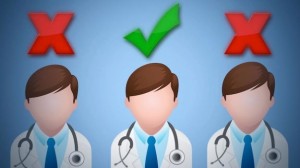December 16th, 2013 by Dr. Val Jones in Opinion
No Comments »
 I am consistently bemused by those who recommend more rigorous or more pervasive standardized testing as the primary means for insuring physician quality. The vast majority of physicians have already passed through a complex gauntlet of multiple choice exams, extended credentialing and certification processes, and lengthy tests of knowledge and skill. And yet, some physicians (to put it bluntly, sorry friends) are very bad at what they do.
I am consistently bemused by those who recommend more rigorous or more pervasive standardized testing as the primary means for insuring physician quality. The vast majority of physicians have already passed through a complex gauntlet of multiple choice exams, extended credentialing and certification processes, and lengthy tests of knowledge and skill. And yet, some physicians (to put it bluntly, sorry friends) are very bad at what they do.
Intellectual intelligence is necessary, but not sufficient, for doctoring. It is emotional intelligence (EI) that is sorely lacking – because it has neither been cultivated, nor selected for, by many training programs. Some educators openly acknowledge the problem, pointing to “extra-curricular activities” as their primary means of distinguishing equally qualified applicants. The disappointing reality is that non-academic performance may be a tie-breaker for students with similar standardized test scores, but raw scores almost always trump any other factor. In the end, we have a physician work force that is highly adept at assimilating and regurgitating facts, but is only accidentally good at human interactions.
Is there hope for change in this arena? I believe that the prognosis is guarded. As our culture becomes more and more digital data-driven, a tsunami of “meaningless use” threatens to drown us all in false quality measures, electronic medical record documentation “quality assurance” requirements, and analysis of trends without comprehension of context or influencing variables outside the scope of the measuring instruments. Lies, damn lies, and statistics. We can’t get enough! And guess who are the biggest proponents of these methods? Why, people who only excel at standardized testing – mostly because their true flaws also lie outside the measuring instruments. Bad doctors (sometimes turned-administrators) themselves are often fueling the onslaught of fruitless quality improvement initiatives.
Dr. Howard Luks, orthopedic surgeon and social media activist, wrote a provocative blog post on the subject of why physicians don’t engage more in social media. He suggests that many avoid it because they lack people-skills in the first place and don’t genuinely enjoy engaging with patients. If you’re a “jerk” in real life, he argues, then what advantage is there to making that more obvious on blogs, Facebook, Twitter, etc.? Better to stay socially quiet.
The interesting thing is that social media might be the most reliable way to discover whether or not your doctor is kind, thoughtful, observant, and detail-oriented. Reading a physician’s thoughts online can help you get to know their true personality and work ethic. In the future it would be nice if medical schools and residency training programs took the time to read applicants’ blogs (for example) instead of crunching their test scores for admission via the path of least resistance. An extra hour of reading up front could save our medical system from a new wave of low EI providers.
As Seth Godin put it, “Uncaring hands are worth avoiding.”
We all recognize the importance of this statement intuitively, but have a hard time quantifying “caring” with standardized tests. That’s why admissions officers and patients alike must use their judgment when selecting doctors. We pay verbal homage to the importance of “clinical judgment” in medicine but in reality are culturally afraid of straying from numbers to support our decision-making.
How will you know a good doctor? You’ll know him [or her obviously] when you see him. And sometimes you can see him best on social media platforms.
***
A few caveats of course:
1. Social Media is a sensitive but not specific test. Meaning, you can probably accurately identify caring doctors from their blogs, etc. but if they don’t have one, it doesn’t mean they aren’t good/caring.
2. It may not matter if you find a great doctor online if they’re not in your limited ACA network. 😕
3. Direct primary care is a potentially excellent way to get connected to exceptional doctors. I am a fan of this movement and have been actively involved in a practice in VA. The practices can reduce costs and enhance quality care, though recent caps on Health Savings Accounts (initiated by the Obama administration) have reduced consumer freedom to spend pre-tax income on direct primary care.
August 25th, 2011 by Bryan Vartabedian, M.D. in Opinion
No Comments »

 Perhaps the biggest challenges facing the next generation of physicians is information overload. The problem: Unlimited information on limited human bandwidth. There’s simply too much to read and see. For physicians the problem is compounded by a perceived responsibility to keep up.
Perhaps the biggest challenges facing the next generation of physicians is information overload. The problem: Unlimited information on limited human bandwidth. There’s simply too much to read and see. For physicians the problem is compounded by a perceived responsibility to keep up.
But the idea that we actually can have our hands around everything is reflective of a time when doctors actually could know all there was to know. Many of today’s physicians were raised at a time when a paper inbox and a pile of journals represented their only information inputs. But things are very different now.
Here are a few ideas on controlling your inputs: Read more »
*This blog post was originally published at 33 Charts*
July 22nd, 2011 by BarbaraFicarraRN in Opinion
No Comments »

Recently, I had the pleasure of being surrounded by brilliant health care thought leaders. First, I delivered a social media presentation at the Eyeforpharma conference. Secondly, I sat in the audience at the Social Communications and Health Care 2011 conference to listen to others present on social media, and participate in a round-table discussion on social media.
It’s clear from the personal discussion that followed with folks from the pharma industry, medical device companies, and hospitals, that they understand the need for social media (or social networking), but they are cautious to dive in.
A few concerns I’ve heard: “social media can be paralyzing,” “senior leadership in the pharma industry is looking for the FDA to make decisions because it’s such a highly regulated industry,” and “it’s still so new, what’s the ROI?” Concerns are real; however there will always be concerns and questions. Sometimes, the best approach is to just dive right in.
The brilliant reason to dive deep into the social media health space is Read more »
*This blog post was originally published at Health in 30*
June 30th, 2011 by Dr. Val Jones in Announcements
10 Comments »

It is with great pleasure that I welcome our CDC colleagues to the Better Health blog team. Going forward, Better Health will feature content from the CDC blogs on a weekly basis, and our collaborative efforts will be highlighted on the CDC blog pages as appropriate.
Better Health and the CDC share a common mission: to reach as many Americans as possible with scientifically accurate, trustworthy, and helpful medical information. As social media platforms (such as blogs, Twitter, and Facebook) become a gathering place for people seeking health information – it is important for experts to be able to provide content through these channels. The CDC’s relationship with Better Health is an excellent example of a public-private partnership that can magnify reach and relevance.
By becoming a content partner with Better Health, the CDC joins a prestigious international team of physicians, nurses, health experts and patient advocates, including notable organizations such as the American College of Physicians blogs, Harvard Health Publications, Diario Medico, Healthline, the Center For Advancing Health, and the Columbia University Department of Surgery. Read more »
May 27th, 2011 by BarbaraFicarraRN in Health Tips, Opinion
No Comments »


Social networking allows doctors, nurses and other health professionals to deeply connect and engage with the community and their colleagues.
“We are standing at the precipice of a new online revolution in health care. As more and more health experts embrace the Internet and increase their social media activity, health information seekers will undoubtedly benefit in profound ways.” [Source: Mashable]
Dynamic health and medical professionals engaged in social networking, using Twitter, Facebook, Blogs and YouTube are on the front-line of new modern medicine.
Today’s modern medicine is all about the patient. Participating, partnering and developing a professional relationship is paramount.
While many health consumers are searching the web for support, reassurance and specific health news and information; doctors and nurses continue to question the value of the internet for patients.
Social networking sites such as Twitter, Facebook, and Blogs are not a waste of time for health professionals because it offers value.
Social networking sites and blogs are a powerful and phenomenal platform to educate patients, raise awareness of health issues and it offers a forum to collaborate and connect. It gives a voice to patients and it allows for the conversation to get started with their doctors and other health care professionals.
Doctors, nurses and other health professionals can help validate what is important for patients.
3 reasons why social networking is not a waste of time Read more »
*This blog post was originally published at Health in 30*
 I am consistently bemused by those who recommend more rigorous or more pervasive standardized testing as the primary means for insuring physician quality. The vast majority of physicians have already passed through a complex gauntlet of multiple choice exams, extended credentialing and certification processes, and lengthy tests of knowledge and skill. And yet, some physicians (to put it bluntly, sorry friends) are very bad at what they do.
I am consistently bemused by those who recommend more rigorous or more pervasive standardized testing as the primary means for insuring physician quality. The vast majority of physicians have already passed through a complex gauntlet of multiple choice exams, extended credentialing and certification processes, and lengthy tests of knowledge and skill. And yet, some physicians (to put it bluntly, sorry friends) are very bad at what they do.













